AMD Zen 4 Ryzen 9 7950X and Ryzen 5 7600X Review: Retaking The High-End
by Ryan Smith & Gavin Bonshor on September 26, 2022 9:00 AM ESTCPU Benchmark Performance: Power, Web, And Science
Our previous set of ‘office’ benchmarks has often been a mix of science and synthetics, so this time we wanted to keep our office section purely on real-world performance. We've also incorporated our power and science testing into this section too.
In this version of our test suite, all the science-focused tests that aren’t ‘simulation’ work are now in our science section. Where possible these benchmarks have been optimized with the latest in vector instructions.
We are using DDR5 memory on the Ryzen 9 7950X and Ryzen 5 7600X, as well as Intel's 12th Gen (Alder Lake) processors at the following settings:
- DDR5-5200 CL44 - Ryzen 7000
- DDR5-4800 (B) CL40 - Intel 12th Gen
All other CPUs such as Ryzen 5000 and 3000 were tested at the relevant JEDEC settings as per the processor's individual memory support with DDR4.
Power
The nature of reporting processor power consumption has become, in part, a dystopian nightmare. Historically the peak power consumption of a processor, as purchased, is given by its Thermal Design Power (TDP, or PL1). For many markets, such as embedded processors, that value of TDP still signifies the peak power consumption. For the processors we test at AnandTech, either desktop, notebook, or enterprise, this is not always the case.
Modern high-performance processors implement a feature called Turbo. This allows, usually for a limited time, a processor to go beyond its rated frequency. Exactly how far the processor goes depends on a few factors, such as the Turbo Power Limit (PL2), whether the peak frequency is hard coded, the thermals, and the power delivery. Turbo can sometimes be very aggressive, allowing power values 2.5x above the rated TDP.
AMD and Intel have different definitions for TDP but are broadly speaking, applied the same. The difference comes from turbo modes, turbo limits, turbo budgets, and how the processors manage that power balance. These topics are 10000-12000 word articles in their own right, and we’ve got a few articles worth reading on the topic.
- Why Intel Processors Draw More Power Than Expected: TDP and Turbo Explained
- Talking TDP, Turbo and Overclocking: An Interview with Intel Fellow Guy Therien
- Reaching for Turbo: Aligning Perception with AMD’s Frequency Metrics
- Intel’s TDP Shenanigans Hurts Everyone
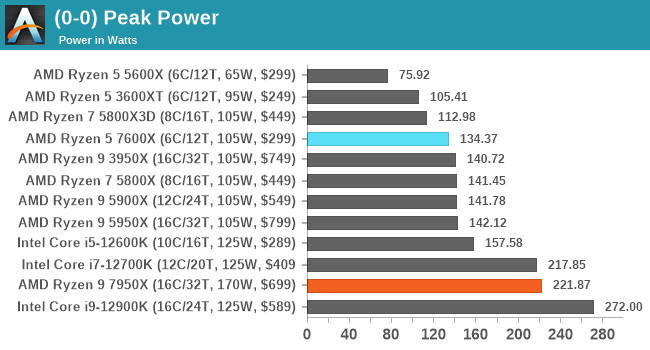
Looking at the results of our Peak Power test, the Ryzen 9 7950X topped out at 221.8 W, which is around 30% higher than the TDP of 170 W it comes with. As stated by AMD, the Power Package Tracking or PPT limit for AM5 motherboards when used with 170W TDP Ryzen 7000 SKUs will be 230 W. Still, while it draws more power than its generational predecessors such as Zen 3 and Zen 2, the Zen 4-based Ryzen 7000 series benefits from higher core clock speeds, a higher single core boost frequency, as well as other implementations around TSMC's 5 nm manufacturing process.
The AMD Ryzen 5 7600X is more aimed at the mid-range, and as such has a lower overall power draw, with the peak power figures in our testing reaching 134.3 W. This is around the same levels of power draw as the Ryzen 9 3950 X, the Ryzen 9 5900X, and the Ryzen 7 5800X. Per AMD's specifications, the Ryzen 5 7600X has a TDP of 105 W, with around a 27 % variance in peak power compared to TDP.
From our testing, so far, it seems that Ryzen 7000 when combined with a premium X670E motherboard allows for up to 30% in terms of extra power allowances for higher single-core boost and overall faster all-core frequencies.
Web
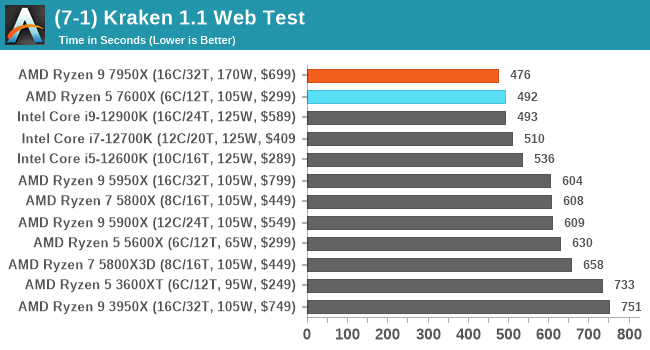
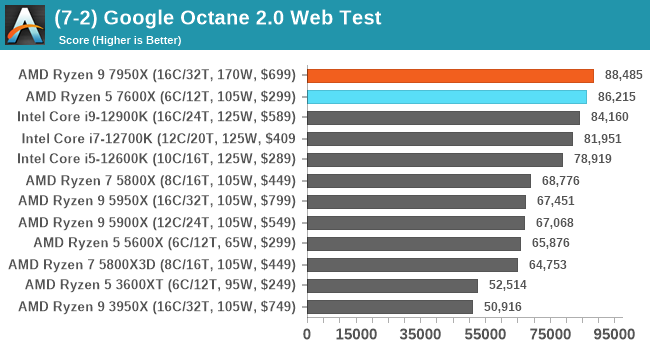
In our web tests, the overall improvements in IPC, frequency, clock speeds, and the switch to DDR5 all play a part in performance here. Both the Ryzen 9 7950X and Ryzen 7 7600X top our charts in regards to web testing, although performance isn't as apparent as it should be in other areas.
Science
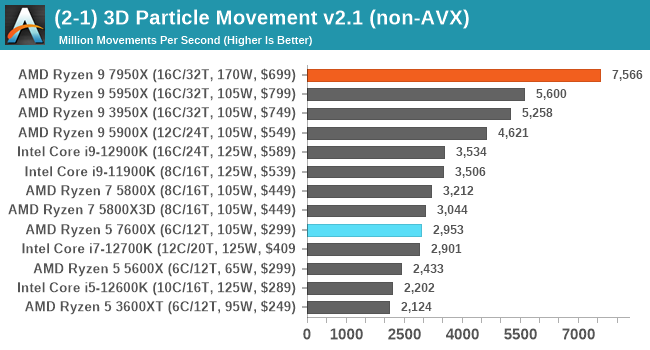
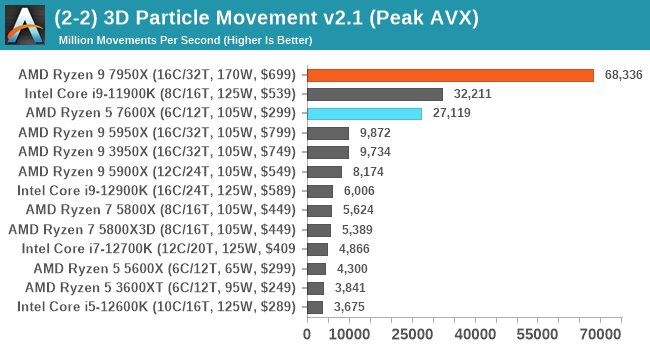
For our 3DPM v2.1 testing, we added in the Intel Core i9-11900K (Rocket Lake) to show performance across AVX workloads. Although Intel officially fused off the AVX2/512 extensions on Alder Lake which did cause a little controversy and gave the impression that AVX-512 on consumer platforms was dead. AMD clearly believes the opposite, as it has implemented it so that AVX-512 runs two cycles over a 256-bit wide instruction. The performance of the Ryzen 9 7950X here is phenomenal, although the Core i9-11900K which did indeed feature AVX instruction sets in the silicon, is still better than the Ryzen 5 7600X with AVX workloads.
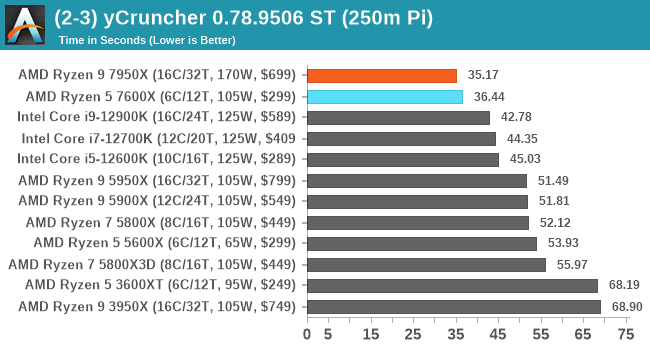
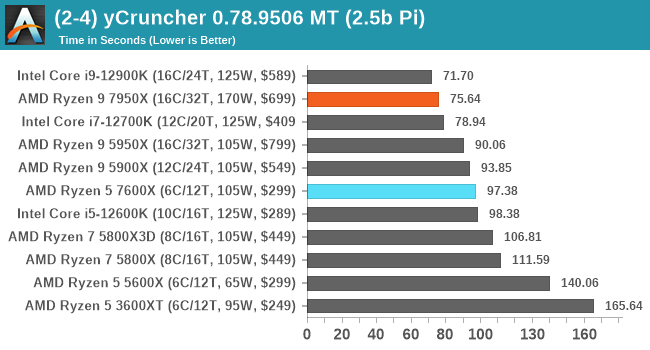
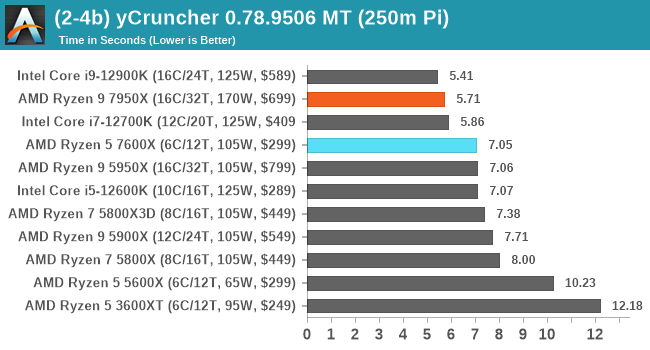
Focusing on our more science-based tests, both the Ryzen 9 7950X and Ryzen 5 7600X perform well against the competition. In our 3DPMv2.1 test in non-AVX, the Ryzen 9 7950X provided a jump of 35% in performance against the previous generation Ryzen 9 5950X processor.
Interestingly, in our yCruncher 0.78 test, the Ryzen 9 7950X and the Core i9-12900K trade blows consistently, although the Ryzen 5 7600X performs well for its price point.










205 Comments
View All Comments
linuxgeex - Monday, September 26, 2022 - link
All Microsoft customers are QA testers, lol. That's always how it's been. ReplyKangal - Tuesday, September 27, 2022 - link
Isn't that what goes for Linux?The only difference is that you don't pay money, you just pay in time, effort, frustration, and your soul.
Reply
Hifihedgehog - Tuesday, September 27, 2022 - link
Exactly. And you compile your own kernel for 24 hours hoping it will finish successfully. Replyat_clucks - Wednesday, October 19, 2022 - link
Not if you use the latest Ryzen 9 7950X. You may still pray it's successful at the end but God will answer a lot faster :). Replyelforeign - Monday, September 26, 2022 - link
Ah yes, the capitalistic adage of less is more. I'm sorry you guys have to deal with this, as with anyone in the workforce, where the powers that be sit on their ass with their cushy millions and say workers can do less with more and pile on with disregard.On a further note, I have been coming to Anandtech since the mid 00's. While I can understand the expectation surrounding good grammar and flawless articles, some issues are bound to come up now and then. The vitriol you guys receive for some simple grammar or syntax mistake is crazy. Reply
rarson - Wednesday, September 28, 2022 - link
"Ah yes, the capitalistic adage of less is more."This is not a thing. Reply
herozeros - Monday, September 26, 2022 - link
Kind reply, thanks. Hope your week lets you catch up.No more copy editors?! I guess my blonde is all now truly grey . . . sigh Reply
Threska - Monday, September 26, 2022 - link
Outsourced to AI. Replyemn13 - Monday, September 26, 2022 - link
I for one thoroughly enjoyed your article, and appreciate the technical content - a few editing nits don't detract from that.And hey, if I were to whine about embarrassing editing mistakes, rather than focusing on a long article written in limited time due to AMD's schedule, I'd poke fun at the 100 000 000 000 $ company's press slides touting their EXPO tech's openness in the form of public "doucments". 😀 Reply
linuxgeex - Monday, September 26, 2022 - link
So long as you're open to community feedback to correct hasty errors, there's no need for copy editors, and you can push your articles faster, which we'll all appreciate. Saying thanks is much more productive than making excuses. It shows that you appreciate your community. Reply